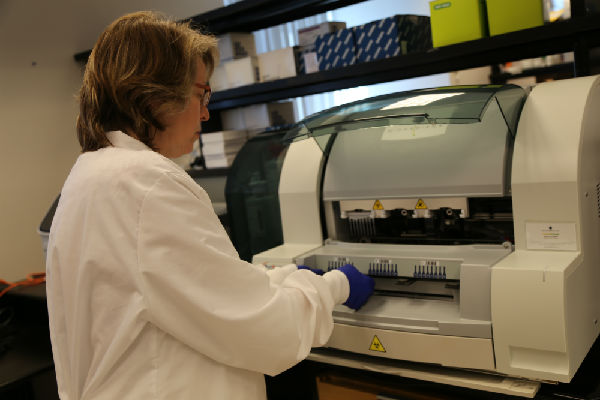Zika is a virus that is usually spread by mosquitoes found in tropical climates. The virus typically causes mild illness—such as headaches, weakness, and fever —that tends to last only a few days. In fact, some people who are infected with Zika don’t even know they have it.

Diagnostic testing for Zika virus is performed by staff from the Viral Zoonoses section of the National Microbiology Laboratory.
The real concern with Zika virus is that it can be extremely dangerous for an unborn child, as it can cause serious birth defects, such as microcephaly. This is a condition that makes a baby’s head small and misshapen, which affects brain development. That’s why, if you or your partner has travelled to a Zika-affected area, health care professionals recommend delaying pregnancy.
Generally speaking, Zika cases in Canada are lower than the rest of the world and the risk to Canadians travelling to countries with recent or ongoing risk of Zika virus infection is low. As of February 28, 2018, there have been 558 travel-related Zika cases reported in Canada.
From the Nursery to the Laboratory
Scientists at the National Microbiology Laboratory (NML) are studying the Zika virus and have recently demonstrated that a treatment using human antibodies can prevent and treat Zika virus infections in mice. While not the first study on antibody treatments for Zika, the NML’s research is one of the most detailed studies of its kind. The research is now being continued by other labs to identify what other animals might benefit from this treatment.
In addition, the NML has rapidly improved and implemented laboratory tests for diagnosing Zika virus for Canadians. In 2017, the NML performed 22,659 tests for Zika virus on 14,947 samples.

PHAC scientist performs diagnostic testing by extracting nucleic acid from multiple Zika virus samples.
Scientists at the NML are also conducting research to find out if various Canadian species of mosquitoes can acquire and transmit Zika virus, along with other mosquito-borne diseases.
In a recent 2017 paper, they examined several species of mosquitoes found in southern Manitoba for their susceptibility to infection and their ability to transmit Zika virus. They found that although Zika virus could grow in many of the mosquito species, only a very small proportion (2%) of one species demonstrated the capacity to transmit it under experimental conditions. It is important to note that these results were found in a laboratory setting, and there is no known evidence of this naturally occurring in local mosquito populations in Canada.
The NML is also carrying out research to evaluate commercial diagnostic kits that identify the presence of Zika virus antibodies in a patient’s blood. These kits would provide more rapid reporting of test results for patients and their health care providers.
For more information about Zika virus, please visit Canada.ca/zika-virus.
